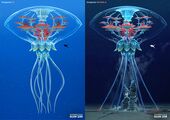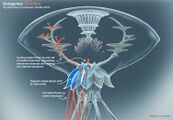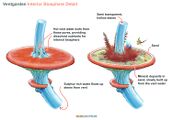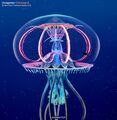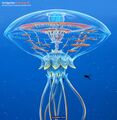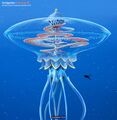Ventgarden: Difference between revisions
GemmaBeepo (talk | contribs) (→Design) |
GemmaBeepo (talk | contribs) |
||
| Line 11: | Line 11: | ||
==Behaviour== |
==Behaviour== |
||
The Ventgarden |
The Ventgarden drifts around the ocean in search of thermal vents. It appears that when the Ventgarden finds a vent, it plants its tentacles into the ground, anchoring it in place above the vent. It stays over the vent, allowing hot water enriched with nutrients to flow into the bell through holes in the body. |
||
When sitting over a thermal vent, several large holes open on the top and bottom of the bell, it is possible that the player is able to swim inside the body through these holes. |
When sitting over a thermal vent, several large holes open on the top and bottom of the bell, it is possible that the player is able to swim inside the body through these holes. |
||
Revision as of 21:27, 17 October 2018
<infobox>
<title source="title1" style="font-weight:bold; text-align:center;"> <default>Ventgarden</default> </title> <image source="image1">
</image> <label>Category</label> <label>Tab</label> <label>Description</label> <label>Affiliation</label> <format></format> <label>Age</label> <label>Description when cooked</label> <label>Description when cured</label> <label>Inhabit</label> <label>Attitude</label> <label>Health</label> <label>Damage</label> <label>Adult Damage</label> <label>Juvenile Damage</label> <label>Drops</label> <label>Perks</label> <label>Biome</label> <label>Active During</label> <label>Size</label> <label>Length</label> <label>Bioreactor</label> <label>DNA</label> <label>Voice Actor</label>
<label>Debug Spawn</label> <format>- {{#explode:{{{debugspawn}}}||0}}
- {{#explode:{{{debugspawn}}}||1}}
- {{#explode:{{{debugspawn}}}||2}}
- {{#explode:{{{debugspawn}}}||3}}
- {{#explode:{{{item_id}}}||0}}
- {{#explode:{{{item_id}}}||1}}
- {{#explode:{{{item_id}}}||2}}
- {{#explode:{{{item_id}}}||3}}
<group layout="horizontal"> <header>Food & Water</header> <label>Food</label> <label>H2O</label> <label>O2</label> </group> <group collapse="open" class="tab-eggs"> <header>Egg</header> <image source="image2"> </image> <label>Tab</label> <label>Description</label> <label>Biome</label> <label>Incubation</label> <label>Bioreactor</label>
<label>Debug Spawn</label> <format>- {{#explode:{{{debugspawn2}}}||0}}
- {{#explode:{{{debugspawn2}}}||1}}
- {{#explode:{{{debugspawn2}}}||2}}
- {{#explode:{{{debugspawn2}}}||3}}
</group> </infobox> The Ventgarden is a massive colonial fauna species that harbors a miniature biome within its bell.
Appearance
The Ventgarden's central body is rounded with a point at the bottom. From the base of the body seven long ciliated tentacles extend downwards, tapering to a point at the end. Between each pair of tentacles is a glowing yellow circle, the nature of which are unknown.
On the top of the body, a huge hollow and transparent bell is attached, with a petal-like set of blue and yellow patterned frills below it. In the centre of the body within the bell, a large red resembling seaweed can be seen. Directly above this and attached to the top of the bell is a large cone-shaped structure that emits a bright cyan glow at night.
From the base of the bell, six long branches protrude and curve upwards, each with multiple "plateaus" attached which provide surfaces for flora to grow within the bell.
Redwort, Writhing Weed and Blue Palms can be seen growing within the bell in the concept art.
Behaviour
The Ventgarden drifts around the ocean in search of thermal vents. It appears that when the Ventgarden finds a vent, it plants its tentacles into the ground, anchoring it in place above the vent. It stays over the vent, allowing hot water enriched with nutrients to flow into the bell through holes in the body.
When sitting over a thermal vent, several large holes open on the top and bottom of the bell, it is possible that the player is able to swim inside the body through these holes.
Design
The Ventgarden appears very similar in appearance to real-life Portuguese man o' war, which is also a colonial organism. It is possible that the Ventgarden's interior biosphere is inspired by the golden jellies of jellyfish lake which harbour photosynthetic glucose-producing algae within their body.
Gallery
Lua error in package.lua at line 80: module 'Dev:Navbox' not found.

